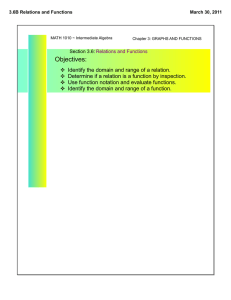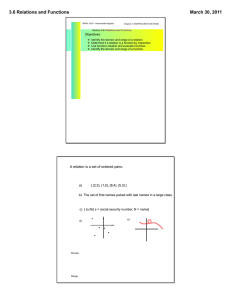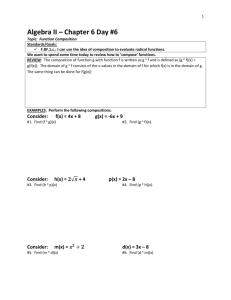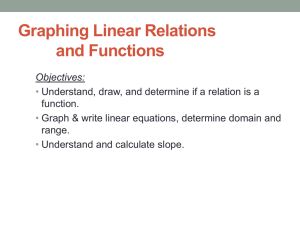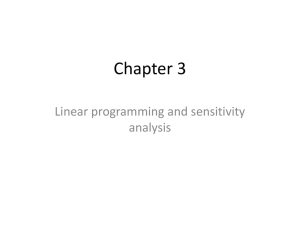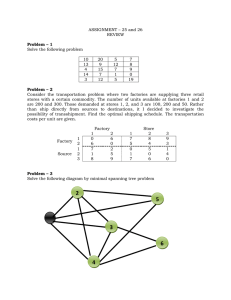6-3
advertisement
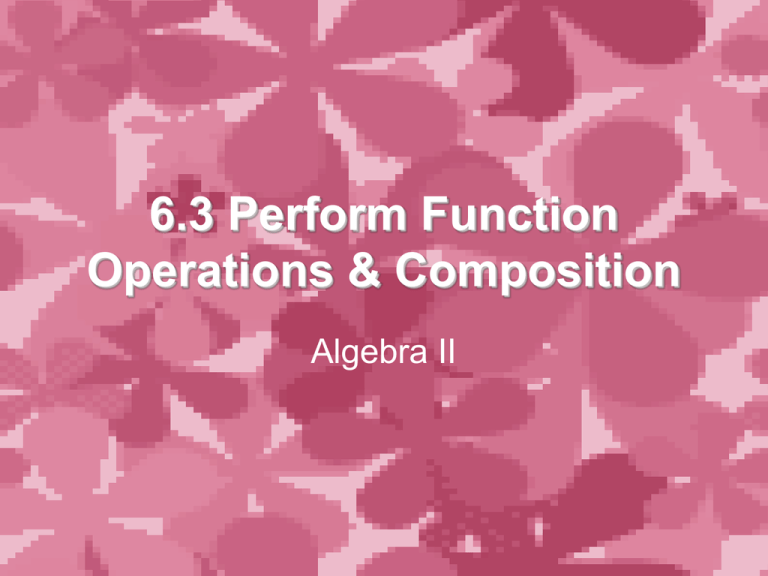
6.3 Perform Function Operations & Composition Algebra II Operations on Functions: for any two functions f(x) & g(x) 1. 2. 3. 4. 5. ** Addition h(x) = f(x) + g(x) Subtraction h(x) = f(x) – g(x) Multiplication h(x) = f(x)*g(x) OR f(x)g(x) Division h(x) = f(x)/g(x) OR f(x) ÷ g(x) Composition h(x) = f(g(x)) OR g(f(x)) Domain – all real x-values that “make sense” (i.e. can’t have a zero in the denominator, can’t take the even nth root of a negative number, etc.) Ex. 1: Let f(x)=3x1/3 & g(x)=2x1/3. Find (a) the sum, (b) the difference, and (c) the domain for each. (a) 3x1/3 + 2x1/3 = 5x1/3 (b) 3x1/3 – 2x1/3 = x1/3 (c) Domain of (a) all real numbers Domain of (b) all real numbers Ex. 2: Let f(x)=4x1/3 & g(x)=x1/2. Find (a) the product, (b) the quotient, and (c) the domain for each. 5 (a) 4x1/3 * x1/2 = 4x1/3+1/2 = 4x5/6 (b) 4x x 1 3 x 6 (c) Domain of (a) all reals ≥ 0, because you can’t take the 6th root of a negative number. 1 2 = 4x1/3-1/2 = 4x-1/6 = 4 x 4 Domain of (b) all reals > 0, because you can’t take the 6th root of a negative number and you can’t have 4 a denominator of zero. 1 6 6 x Composition • f(g(x)) means you take the function g and plug it in for the x-values in the function f, then simplify. • g(f(x)) means you take the function f and plug it in for the x-values in the function g, then simplify. Evaluate Compositions of functions Ex. 3 • Let f(x) =3x – 4 and g(x) = x 1 • What is the value of f(g(-3))? 2 Ex. 4: Let f(x)=2x-1 & g(x)=x2-1. Find (a) f(g(x)), (b) g(f(x)), (c) f(f(x)), and (d) the domain of each. (a) 2(x2-1)-1 = (b) (2x-1)2-1 = 22x-2-1 4 = 2 1 x 2 x2 1 (c) 2(2x-1)-1 = 2(2-1x) = 2x x 2 (d) Domain of (a) all reals except x=±1. Domain of (b) all reals except x=0. Domain of (c) all reals except x=0, because 2x-1 can’t have x=0. Ex. 5 Find Composition of Functions • Perform the indicated operation & state the domain. x4 • Let g(x) =2x -7 & h( x ) 3 • 5a.) g(h(x)) 5b.) g(g(x)) Assignment 6-3B Compositions •
